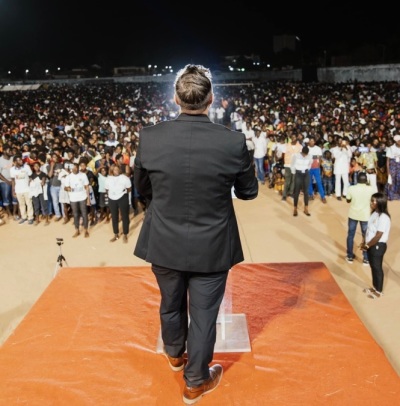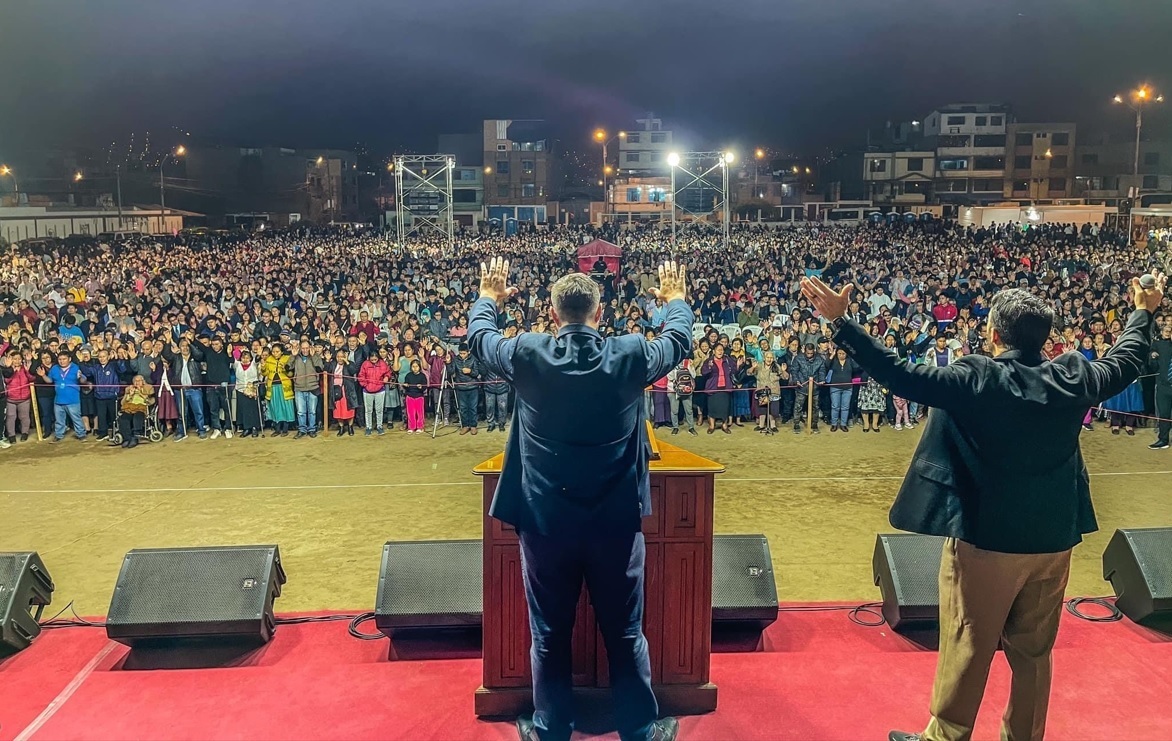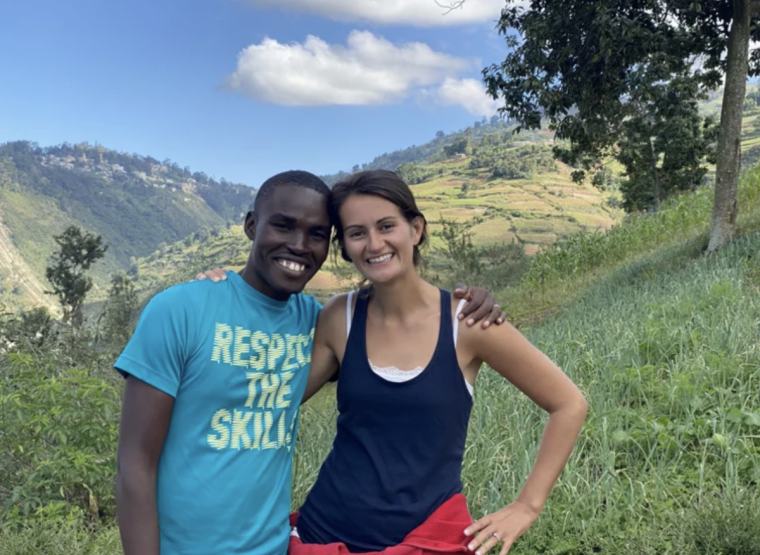
An evangelism group that recently held events in West Africa and South America that resulted in over a reported 66,000 decisions for Christ is planning to hold its first-ever crusade in the United States.
World Harvest Global, an outreach organization headquartered in Grand Prairie, Texas, which earlier this year held events in Guinea-Bissau, Zambia and Peru, is planning to hold its first U.S.-based gathering in South Carolina next year.
Jacob Ebersole, founder and president of World Harvest, told The Christian Post in an interview that his organization has been planning to hold the upstate South Carolina event for over two years.
“The team already formed for this is pretty significant,” said Ebersole. “In Jesus’ name, we’re going to see a move of God start there that will spread through the whole state of South Carolina. What happens beyond that, I’ll leave up to the Lord.”
Ebersole hopes the event next year will “reach the whole nation” through their social media strategy.
He says his ministry is “trying to walk through the lens of 1 Corinthians 13” in their evangelism events.
“You can move mountains, speak with the tongues of angels, but if you have not love, you have nothing,” he said, paraphrasing the biblical passage. “We really care about this at every level.”
“We try to make sure we do everything with excellence, and I think what’s happening is people are starting to notice, and they want to be a part of it. And so, our team is growing, and now it’s like, people from all around the world that are coming on board to be a part of what God is doing through World Harvest.”
Guinea-Bissau

A Muslim-majority nation located in West Africa, World Harvest held a series of crusade events in Guinea-Bissau’s capital city Bissau and the city of Gabu in late March and early April.
According to Ebersole, the country has seen a recent rise in its Islamic population. When pastors living in the nation reached out to World Harvest, it was considered “an emergency call.”
“They were like, ‘if we don’t move now, it’s going to be a Muslim state, and they are taking over quickly,'” Ebersole told CP. “And so, we met with the right people, formed our board of advisors there, in the capital city.”
“The bishops and the pastors that I was dealing with literally saw this as their last shot to take Guinea-Bissau back for Jesus.”
According to the Joshua Project, Muslims comprise just over half of Guinea-Bissau’s population, while Christian adherents comprise over 11%.
Ebersole, who has been organizing overseas evangelism events for the past couple of years, described the Guinea-Bissau event as “the most difficult campaign that I’ve ever had to go through.”
“The spiritual warfare in that almost ripped the team apart, almost ripped me apart,” he said. “But thank the Lord; He was faithful every step of the way. After about a year of plowing and getting doors shut left and right, we finally locked in the location.”
One thing helping their efforts was young people, he said, as there had been a revival before the first in-person World Harvest events. Thousands of youth showed up for worship at the field reserved for the crusade event.
According to Ebersole, the “worship and prayer on the crusade field” mutated into large crowds of mostly young people “taking the streets” in worship and even marching to the local airport.
“They could have pulled our permits, but what happened was we made so much noise in the city that it got all the way up to the president of Guinea-Bissau, and he wanted to meet us,” Ebersole said.
World Harvest leaders eventually met with Muslim President Umaro Sissoco Embaló for an hour, Ebersole recalled, with the national leader helping them get some of their equipment into the country after it was stuck at the border.
“We had just enough time to set up for the crusade that took place the next day. It was time to begin, and they were raising up the speakers and raising up the screens. So, just in the nick of time. And then, he showed up to the first day of the campaign,” said Ebersole.
“There was joy in the city. And I don’t think they had seen that before. It wasn’t like it was this aggressive, ‘we’re punching you in the face with Jesus’ thing. It was joy in the streets, and it was young people, and I was in tears just watching them do this week after week.”
After holding events in the capital city, World Harvest went to Gabu, a town described by Ebersole as “a Muslim stronghold” and the “most dangerous, dark territory in the nation.”
According to the World Harvest leader, hundreds of Guinea-Bissau youth volunteered to travel there, with impromptu worship and evangelism taking place in the city.
A local Youth With a Mission chapter supported the Gabu mission, with around 100 youth staying at their facility during the crusade.
Ebersole told CP that the Gabu crusade was “a God thing” that “had nothing to do with us” but rather was a matter of “just faith and guts.”
Ebersole says that a little under 18,500 people came to Christ during their two crusades, not including the thousands saved through other initiatives within the West African nation.
David Hoffman, the director of Kingdom Enterprises, an outreach and evangelism ministry in Tucson, Arizona, who has recently come to know Ebersole, told CP that he was impressed by the outpouring of faith in Guinea-Bissau.
Hoffman saw videos of the youth marching posted online, telling CP that he “heard them all singing and praising God” and felt that “this is something unique because where do you see this happening?”
Hoffman was also impressed with how World Harvest “did back-to-back Gospel campaigns,” which he found “pretty incredible” because it is “hard to just go boom, boom, boom, from thing to thing” with evangelism events.
“I thought, wow, this is really legitimate. This is something where God is really moving,” said Hoffman to CP. “I was just blown away seeing some of the things that God was doing.”
Zambia
Later in April, World Harvest held a crusade event in Zambia, a nation in Southern Africa located approximately 3,400 miles southeast of Guinea-Bissau.
The evangelism group held gatherings at the capital Lusaka, a city that, according to Ebersole, is known for “gang activity [and] prostitution.”
“But the Church is on fire in Zambia,” Ebersole told CP, adding that “it was a lot easier” to organize the event and that it “was the biggest crowd I’d ever preached in front of.”
Ebersole described how, on each night that they held worship, large numbers of youth came forward to not only accept Jesus as their Lord but also to get rid of past vices.
“I saw maybe thousands of young people coming forward and laying down their idols, addictions, condoms, booze, witchcraft, magic arts,” Ebersole recounted.
“So, we pulled stuff out of the barrels; I started to put it on the stage. And oftentimes, I had to turn around and ask the pastor what this was because they were bringing some weird stuff.”
Ebersole noted that while he “had seen stuff like this before on the crusade stage,” he had not seen such activity happen “to that extent,” stressing that “it was just a constant.”
“Everybody on the platform was freaking out. Going live on Facebook and Instagram and celebrating as these kids come in tears, and they got a needle in this hand and booze in this hand, and they’re shaking over the barrel, and they let it go,” he said.
“Zambia changed my life.”
According to Ebersole, there were approximately 45,000 people who made decisions for Christ during the April crusade event in Zambia.
Peru
In May, World Harvest held a crusade in Peru, marking the first time that the evangelism organization had overseen a campaign in South America, according to Ebersole.
The event was in San Juan de Lurigancho, a heavily populated district of Lima that is generally considered a dangerous part of the metropolitan area.
Ebersole told CP that his group “chose to have a crusade there for that reason” because it was known for having “a lot of prostitution, a lot of crime.”
Ebersole recalled that he “started weeping” when he looked “out at the hotel window” and saw “that crusade field fill up,” admitting that there are times when he does not understand how it is that his events can draw such large crowds.
“I still, to this day, don’t know why people come,” he said to CP. “It’s like, you don’t really know us; I don’t know why you come and listen; I don’t know why you sit for four hours.”
“It still boggles my mind today why people listen to the Gospel, and night after night, I’d say the crowd size almost doubled night after night in Peru.”
Hoffman commended the work of Ebersole and his team, telling CP that World Harvest does “more of a sobering Gospel call” meant to “only attract people that are seriously wanting to come to Christ, as opposed to just getting caught up in the emotion of it all.”
“They’re not just looking to have a ton of people come forward and say ‘all those people came,'” Hoffman explained. “They document how many people actually come up, and then they distribute those decision cards to churches to get churches involved in the follow-up.”
“Churches in Peru are starting to have new families coming, not people that have been going to church that just got a little more excited about it, but brand-new people popping into church and starting to come after the crusades.”
Ebersole told CP that in Peru, as with other crusade locations, they held a “Celebration Day” right after the evangelism event ended, which involved connecting local pastors with the people who made decisions for Christ.
“Before their hand comes down, they have a follow-up card in their hand, and there’s a counselor there that’s been trained for months to handle that responsibility. Those cards then get taken to a designated location, and they’re treated like gold,” Ebersole explained.
On the “Celebration Day,” they distribute the cards of people who made decisions for Christ to the pastors based on which part of the city they live in, with Ebersole saying that “We’re handing the fish over to the local church.”
“The key to it, though, is the work that we do with the Church leading up to the crusade,” Ebersole added. “So it’s six months of time with the pastors preparing them for this harvest and that’s really the follow-up system. We come in with the infrastructure, but it’s the heart cry that the pastors have to follow up with these people that we care about.”
According to Ebersole, there were a little under 3,500 decisions made in their Peru event, with one local pastor reporting that six new families had started attending his church because of the crusade.
Victory and pain
When thinking about the successes of his ministry outreach, Ebersole told CP that “all of this is blowing my mind,” adding that “being faithful in a little has turned into something that I have never anticipated.”
Ebersole said he came from a broken home and did not become a Christian until he was a teenager in 2006 when a pastor preached the Gospel to him outside a restaurant parking lot.
“Little by little, I started to realize that God was calling me to preach the Gospel to lost people the same way that that pastor did,” he said, saying that looking at his life trajectory “is still sort of freaking me out, a little bit.”
“So, in a strange way, I know as ministers, we preach from a place of victory, but I also simultaneously preach from a place of pain, remembering who I was then.”




























![[Video] More – Aghogho » GospelHotspot](https://gospelhotspot.net/wp-content/uploads/2024/04/More-Aghogho.jpeg)
















